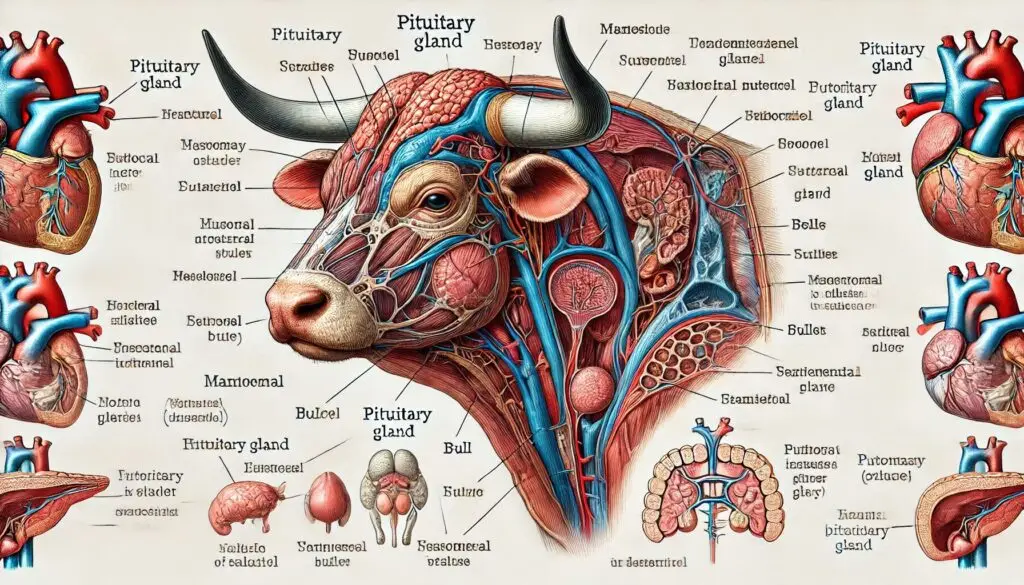Pituitary Gland Hormones in Animals

Introduction to the Pituitary Gland
The pituitary gland is a small but vital endocrine organ located at the base of the brain. It is often called the “master gland” because it regulates many bodily functions by releasing hormones that influence other glands. This article delves into the hormones produced by the pituitary gland in animals, their roles, and how they affect overall health.
Anatomy of the Pituitary Gland
Structure and Location
The pituitary gland is divided into two main parts:
- Anterior Pituitary: This front portion produces several key hormones.
- Posterior Pituitary: This back section stores and releases hormones made by the hypothalamus.
The gland is about the size of a pea and is connected to the hypothalamus, which controls its activities. For more information on its anatomy, visit Britannica.
Hormones of the Anterior Pituitary
The anterior pituitary produces several important hormones:
Growth Hormone (GH)
Growth hormone stimulates growth and cell reproduction. It affects protein synthesis and fat metabolism. In animals, GH is crucial for normal growth and development. For more details on growth hormone, visit Healthline.
Prolactin (PRL)
Prolactin primarily promotes milk production in mammals. It also plays roles in reproductive health and behavior. Learn more about prolactin’s functions at WebMD.
Adrenocorticotropic Hormone (ACTH)
ACTH stimulates the adrenal glands to produce cortisol, which helps manage stress responses. It is vital for maintaining homeostasis during stressful situations. For additional insights on ACTH, check out Mayo Clinic.
Thyroid-Stimulating Hormone (TSH)
TSH regulates thyroid hormone production, which is essential for metabolism. It influences energy levels and overall metabolic rate. Find more information about TSH at Endocrine Society.
Follicle-Stimulating Hormone (FSH)
FSH plays a critical role in reproductive processes. In females, it assists in egg development; in males, it supports sperm production. Explore FSH’s role further at Cleveland Clinic.
Luteinizing Hormone (LH)
LH triggers ovulation in females and stimulates testosterone production in males. It works closely with FSH to regulate reproductive functions. Learn more about LH at American Pregnancy Association.
Hormones of the Posterior Pituitary
The posterior pituitary primarily releases two hormones produced by the hypothalamus:
Antidiuretic Hormone (ADH)
ADH helps regulate water balance by promoting water reabsorption in the kidneys. This hormone is crucial for maintaining fluid balance within the body. For more details on ADH, visit National Kidney Foundation.
Oxytocin
Oxytocin plays a significant role in social bonding, sexual reproduction, and childbirth. It stimulates uterine contractions during labor and milk ejection during breastfeeding. Learn more about oxytocin’s effects at Harvard Health.
Functions of Pituitary Hormones
Growth Regulation
Hormones like GH are essential for growth regulation. They stimulate cellular growth and division, impacting overall body size and health.
Metabolism Control
TSH and ACTH play pivotal roles in metabolism control. TSH regulates thyroid function, while ACTH influences cortisol levels during stress.
Reproductive Health
FSH and LH are critical for reproductive health. They regulate gamete production and hormonal cycles in both males and females.
Water Balance Management
ADH is vital for managing water balance. It ensures that the body retains necessary fluids, preventing dehydration.
The Importance of Hormonal Balance
Maintaining hormonal balance is crucial for overall health. An imbalance can lead to various health issues such as growth disorders, metabolic syndromes, or reproductive challenges.
Common Disorders Related to Pituitary Hormones
- Acromegaly: Caused by excess GH, leading to enlarged bones.
- Hypopituitarism: A deficiency of one or more pituitary hormones.
- Diabetes Insipidus: Results from insufficient ADH production.
- Hyperprolactinemia: Elevated prolactin levels can disrupt menstrual cycles.
For further reading on these disorders, check out Cleveland Clinic’s overview.
Conclusion
The pituitary gland’s hormones play essential roles in regulating various physiological processes in animals. Understanding these hormones helps us appreciate their impact on growth, metabolism, reproduction, and overall health. Maintaining hormonal balance is crucial for preventing disorders associated with this vital gland.
More from Veterinary Physiology:
https://wiseias.com/pituitary-gland/
https://wiseias.com/thyroid-gland-in-animals/
https://wiseias.com/cerebrospinal-fluid/
https://wiseias.com/gas-exchange-in-birds/
https://wiseias.com/the-role-of-kidneys-in-acid-base-balance/




Responses